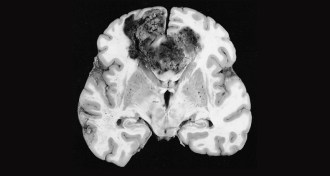Neuroscience
-
 Health & Medicine
Health & MedicineDiet fix eases Huntington’s symptoms in mice
Supplement improves health of rodents with mutation that causes neurodegeneration like that seen in Huntington’s disease.
-
 Neuroscience
NeuroscienceScans suggest how the mind solves ethical dilemmas
Brain scans suggest how the mind solves a moral dilemma.
-
 Health & Medicine
Health & MedicineSmall molecule makes brain cancer cells collapse and die
A small molecule, Vacquinol-1, may provide a different way to target and kill cells in glioblastomas, a type of brain tumor.
-
 Life
LifeHuman noses know more than 1 trillion odors
Sense of smell displays a vast reach in study of people’s ability to distinguish between scents.
By Bruce Bower -
 Neuroscience
NeuroscienceCalcium in alcoholism drug may be what prevents relapse
Acamprosate, one of the few drugs to treat alcoholism, may be nothing more than a vehicle for a calcium supplement.
-
 Neuroscience
NeurosciencePianists learn better by playing
Pianists’ muscle memory helped them recognize incorrect notes.
-
 Neuroscience
NeuroscienceBrain chemicals help worms live long and prosper
Serotonin and dopamine accompany long lives in C. elegans worms under caloric restriction.
-
 Planetary Science
Planetary ScienceFeedback
Readers respond to a special report on neuroscience and discuss moon dust.
-
 Neuroscience
NeuroscienceHeartbeats help people see
People were more likely to spot a flash of a hard-to-see ring when the image was presented right after a heartbeat
-
 Neuroscience
NeuroscienceMe, Myself, and Why
Me, Myself, and Why is an ambitious effort to dissect the hodgepodge of genetic and environmental factors that sculpt people’s identities.
By Meghan Rosen -
 Neuroscience
NeuroscienceMusic doesn’t move some people
One study offers a glimpse into those who find no enjoyment in tunes.
-
 Neuroscience
NeuroscienceBrain uses decision-making region to tell blue from green
Language and early visual areas of the brain are not crucial for distinguishing colors, an fMRI study suggests.